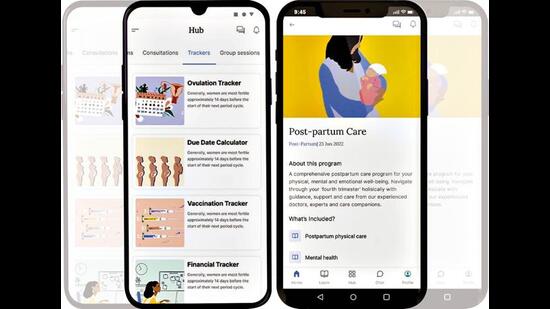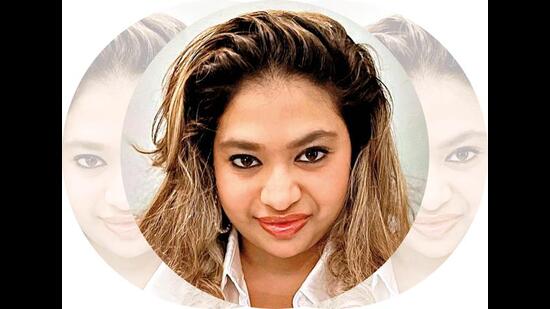[ad_1]
When Carina Kohli was 13 years old, she was diagnosed with PCOS (polycystic ovary syndrome).
Unlike most Indian women, Carina comes from a well-to-do family. But that didn’t mean that her experience with the healthcare system was made much easier.
“I faced many inequalities when it came to accessing judgement-free healthcare, information and support,” Carina remembers. “There were many grey areas when it came to fertility and healthcare options for women. And, when I returned to India after attending university abroad, I had a wake-up call about how inaccessible and unaffordable healthcare in India really is. There are extreme divides of wealth, infrastructure and the urban-rural mileau.”
Today, Carina Kohli is the founder and CEO of HUMM, a healthcare app that offers unlimited, affordable and personal healthcare to mothers, families and organisations, starting with a focus on post-partum, postnatal and baby healthcare.
The platform is a personal care companion that offers unlimited video consultations with specialised doctors and experts, unlimited chats with in-house doulas, doctor-verified lessons, personalised insights through health tools and group classes and experiences. Their focus areas include post-natal check-ups, recovery through physiotherapy post C-section or natural delivery, mental health, lactation and breastfeeding, nutrition and fitness, paediatric care, relationship management, sexual intimacy, work-life balance, financial planning and return to work post-maternity leave.
The making of an app
The seed of the idea for the app had been planted during her own struggles with the healthcare system and, as the daughter of chocolatier Zeba Kohli—whose Fantasie Fine Chocolate brand has won her a range of awards for her entrepreneurial skills—Carina has entrepreneurship in her blood.
So, she studied business management with a focus on entrepreneurship at the University of St. Andrews, Scotland, from which she graduated in 2017, and then worked at a textile manufacturing company in a rotational role, spending time in different departments such as finance, HR and sales.
Having seen what it takes to run a company, Carina then began planning her own venture. By January 2021, she had launched a content and community web app called Baby Space through which users could access doctor-verified information and interact with other people in similar situations. Since it was the peak of the pandemic at the time, new parents and pregnant women were afraid and isolated, and Baby Space grew to become a community of 16,000+ people.
At that point, Carina and her team conducted studies and focus group discussions to understand what women need, want and are willing to pay for. This gave her insights about the market and the industry, all of which went into the building of HUMM.

Bridging the gender gap
Carina has always been level-headed, mature and calm. Today, she has higher sense of purpose.
“There is so much growth but still so much potential in the healthcare industry,” she says. “And when it comes to women’s health and femtech, the potential is completely untapped. There is a gender inequality in accessibility. A study found that 37 per cent of women in India have access to healthcare, compared to 67 per cent of men.”
As someone who once suffered from PCOS, she also notes that the hormonal medical condition is more prevalent than ever, and that one out of every five women go through this.
HUMM’s focus is on the holistic care of a person—dealing with not just physical conditions or imbalances, but emotional and mental ones as well.
Their health programmes are built with experts and doctors to ensure that all the user’s issues and requirements are taken care of through diagnosis, treatment and management, whichever is applicable. Their users get unlimited 1:1 consultations with experts and doctors, unlimited chats with in-house doulas and birth educators, access to doctors and expert verified lessons, quizzes and handbooks, bi-weekly check ins and weekly support groups.
For sexual health care needs, users can consult an expert, chat with the in-house care team or access expert/doctor verified lessons and guides on various topics.
Several factors contribute to the gender gap in healthcare: a conservative point of view, lack of information, lack of affordability, geographic location and infrastructure to name only a few.
Only 16 per cent of women in rural India receive full antenatal care as compared to only 31 per cent of women in urban India. And some seven per cent of families in India cannot access the healthcare they need because they cannot afford it.
“We find it our duty to ensure that we provide verified information and educate and communicate the importance of modern medicine and healthcare so that our patients can make fully informed decisions in terms of treatments,” says Carina.
Digital wellness
She chose to base her company on an app because the pandemic has increased the use of digital health technology and telemedicine.
“While digital health and telemedicine have existed for a few years now, the pandemic showed us all the convenience, cost-effectiveness and dependability of digital healthcare,” Carina explains. “Consumers are more open to trying it out and learning more about digital health options.”
Digital healthcare is also now perceived as an effective, cost-effective and convenient solution to the lack of healthcare infrastructure, and the need to include wellness in lifestyles focussed on work.
“There’s a new movement towards health, wellness and adopting healthier lifestyle choices,” says Carina. “Consumers are more aware and want to make well-informed choices regarding their health. This has pushed digital health companies to innovate further and create better digital health solutions.”
The pandemic also brought to light the mental health issues of women and mothers. “A general analysis of the mental state of women in the work force showed a new underlying fear among young mothers about leaving their babies with caregivers or someone else while they are at work,” explains Carina.
“Employers need to ensure that returning mothers and working parents get the healthcare, and support and health they need so that they can manage their home and be motivated to work,” she says.
‘Just getting started’
Carina is two years into her business now and most people would likely describe her as a successful entrepreneur. But that’s not how she feels about herself.
“I feel my team and I still have a long way to go to create an impact,” she says. “But being an entrepreneur in this space is extremely rewarding. When we see our health programme help app users find solutions to their problems and feel supported in their parenthood journey, it feels good. Building a healthcare company means constantly learning, listening and iterating so that we can ensure we give our users the best possible product we can.”
She’s particularly delighted by the fact that her app is focussed on women at a time when issues like women’s health, mental health and fertility still carry stigmas, even though there has been some progress in removing those stigmas.
“We have barely scratched the surface when it comes to redefining women’s health,” Carina muses. “We’re just getting started!”

Anandita De is a luxury lifestyle consultant & writer
From HT Brunch, September 17, 2022
Follow us on twitter.com/HTBrunch
Connect with us on facebook.com/hindustantimesbrunch
[ad_2]
Source link








